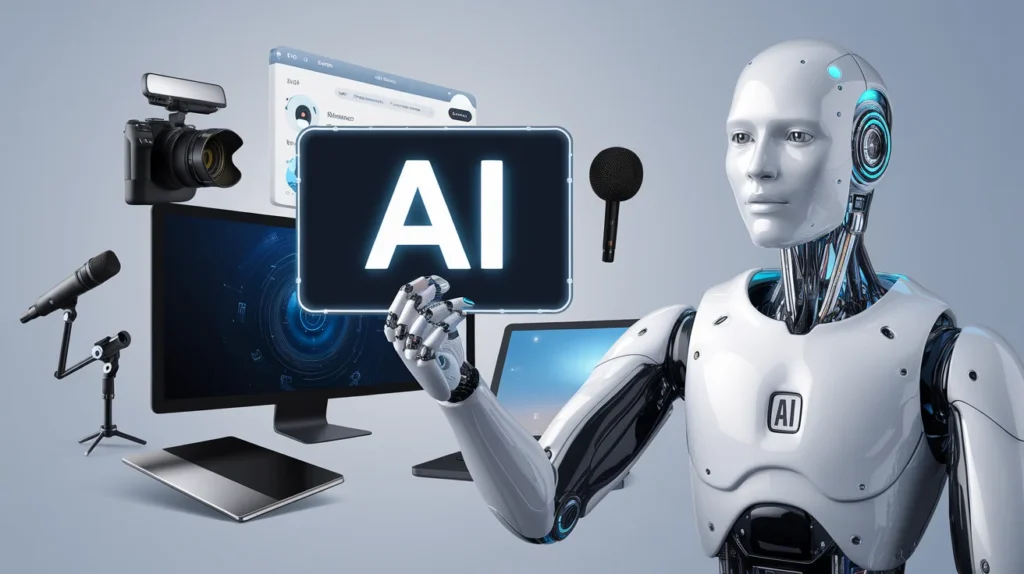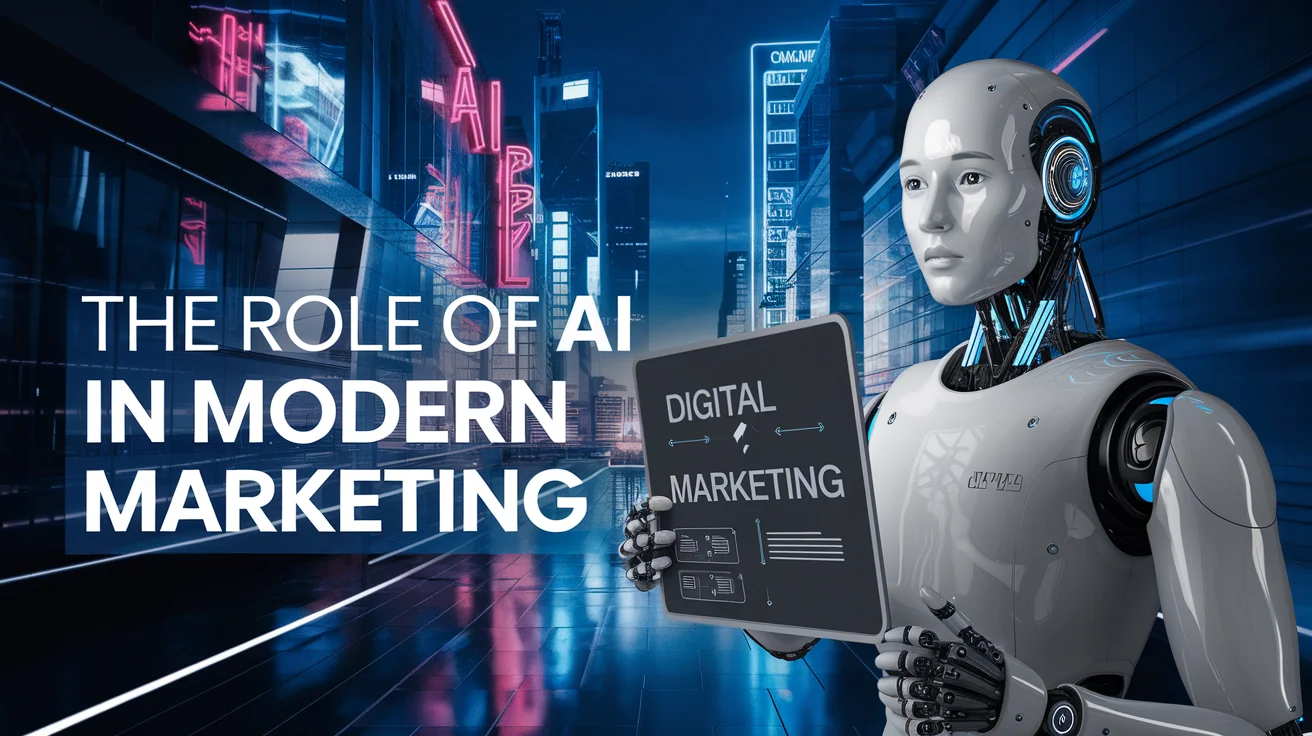In today’s rapidly evolving digital world, artificial intelligence (AI) has revolutionised every industry, and marketing is no exception. The role of AI in modern marketing is becoming increasingly significant, reshaping how businesses approach customer engagement, content creation, and data-driven decision-making.
As AI technologies continue to advance, companies are finding innovative ways to enhance their marketing strategies and stay ahead of the competition.
This article examines the pivotal role of AI in contemporary marketing, its influence on various marketing channels, and how businesses can utilise AI tools to enhance their marketing strategies.
By diving deeper into the applications of AI in marketing, companies can create more personalised experiences for their customers, optimise campaigns, and gain valuable insights.
The Rise of AI-Powered Tools in Marketing
AI has introduced an array of tools and technologies that empower marketers to optimise their campaigns in ways that were not possible before. From AI-driven analytics to automated content generation, these tools are transforming the marketing landscape.
One of the key aspects of AI’s role in modern marketing is its ability to analyse vast amounts of data and provide actionable insights.
For example, AI algorithms can track customer behavior across various touchpoints and predict their future actions, allowing marketers to target their audience more effectively.
AI tools, such as chatbots, predictive analytics, and recommendation engines, are just a few examples of how AI is reshaping the marketing world.
With these tools, marketers can automate time-consuming tasks, enabling them to focus more on strategic aspects of their campaigns. Whether it’s automating email marketing or improving customer segmentation, AI tools make it easier to optimise campaigns and drive better results.
Personalisation and Customer Experience

AI is playing a critical role in delivering highly personalised customer experiences. With AI-powered tools, marketers can segment their audiences more effectively and create tailored experiences for each group. By leveraging data from customer interactions, AI can recommend products, services, and content that are most likely to resonate with a specific individual.
AI’s ability to analyze customer data at scale enables marketers to deliver personalized experiences across various channels, including websites, social media, and email.
By providing personalised content and messaging, businesses can increase customer engagement, satisfaction, and loyalty. In fact, studies show that personalised experiences drive higher conversion rates and customer retention.
AI is also enhancing the customer journey by predicting potential pain points and offering proactive solutions. For example, AI-powered chatbots can provide instant support, answer questions, and guide customers through the buying process.
This not only improves the customer experience but also boosts the efficiency of marketing campaigns.
Benefits of AI in Modern Marketing
AI has numerous benefits that are making it an essential tool for marketers. Below are some of the top advantages of integrating AI into marketing strategies:
- Enhanced Targeting and Segmentation: AI helps marketers analyse customer behaviour and segment their audience more accurately. By understanding customer preferences, AI can help marketers tailor their campaigns to specific groups.
- Improved Decision-Making: AI algorithms can analyse vast amounts of data and provide insights that help marketers make data-driven decisions. This enables businesses to optimize their campaigns in real-time.
- Time and Cost Savings: By automating tasks such as email marketing, content creation, and social media management, AI reduces the workload of marketing teams, enabling them to focus on high-value activities.
- Increased Customer Engagement: Personalised content and experiences powered by AI can significantly improve customer engagement. By offering relevant recommendations and tailored messages, businesses can build stronger relationships with their audience.
- Optimised Content Creation: AI tools, such as natural language generation (NLG) and automated content creation platforms, can generate high-quality content quickly and efficiently. This helps businesses produce more content without compromising quality.
AI-Driven Advertising
One of the most prominent uses of AI in marketing is in the field of advertising. AI has transformed how businesses create, target, and optimise their ads. By analysing customer data, AI can identify the most effective channels, timing, and messaging for an ad campaign.
For example, AI algorithms can help businesses identify which keywords and phrases are most likely to drive clicks and conversions. Additionally, AI-powered platforms like Google Ads and Facebook Ads utilize machine learning to automatically optimize campaigns for improved results.
These platforms can adjust bidding strategies, targeting criteria, and ad creatives in real-time to maximise ad performance.
Furthermore, AI is enabling the creation of more engaging and dynamic ads. With technologies like deep learning and computer vision, AI can create personalised videos and display ads based on user preferences and behaviour.
This level of personalisation makes ads more relevant, increasing the chances of conversion.
The Future of AI in Marketing
The future of AI in marketing appears promising, with numerous innovations on the horizon. As AI technologies continue to evolve, businesses will have access to increasingly sophisticated tools to enhance their marketing strategies. Some potential developments in the AI-powered marketing landscape include:
- Advanced Customer Insights: AI will continue to improve its ability to predict customer behaviour and preferences. By analysing customer interactions in real-time, AI will provide even more accurate insights that marketers can use to refine their strategies.
- Hyper-Personalisation: As AI gets better at analysing customer data, marketers will be able to create hyper-personalised experiences that go beyond basic segmentation. AI will help deliver unique, tailored experiences for individual customers at scale.
- AI-Generated Content: The future of content creation will likely involve even more AI-driven tools. Natural language processing (NLP) and AI-powered content platforms will continue to evolve, enabling marketers to create high-quality content with minimal human intervention.
- Voice and Visual Search: AI’s role in voice and visual search is expanding, and businesses will need to adjust their strategies to capitalise on these technologies. As more consumers use voice assistants and visual search tools, AI will help companies to optimise their content for these channels.
Conclusion
The role of AI in modern marketing is undeniable. From enhancing targeting and personalisation to automating tasks and optimising ad campaigns, AI is helping businesses improve their marketing efforts and drive better results.
As AI technologies continue to advance, companies will need to stay ahead of the curve by embracing these tools and using them to deliver exceptional customer experiences.
By integrating AI into their marketing strategies, businesses can gain a competitive edge, reduce costs, and improve efficiency.
The key to success lies in understanding how AI can be leveraged effectively and aligning it with the unique needs of the business and its audience. In the ever-evolving world of marketing, AI is not just a trend—it’s the future.
Frequently Asked Questions (FAQ) about The Role of AI in Modern Marketing
1. What is the role of AI in marketing?
AI plays a significant role in modern marketing by enabling businesses to automate processes, personalise customer experiences, and optimise campaigns. It helps marketers analyse large volumes of data, predict consumer behaviour, and create more targeted, efficient, and engaging marketing strategies.
2. How does AI improve customer personalisation in marketing?
AI enhances personalisation by analysing customer data, including browsing history, purchase patterns, and social media activity. This data enables businesses to deliver highly targeted content, product recommendations, and ads tailored to individual preferences, thereby increasing engagement and conversion rates.
3. Can AI help reduce marketing costs?
Yes, AI can significantly reduce marketing costs by automating routine tasks such as content generation, email marketing, and customer service. AI tools, such as chatbots, can handle customer queries, while predictive analytics help optimize campaigns, making marketing efforts more efficient and cost-effective.
4. What are AI-powered tools in marketing?
AI-powered tools include platforms for predictive analytics, customer segmentation, chatbots, recommendation engines, and automated content creation tools. These tools help marketers gain insights, streamline workflows, and enhance targeting, enabling more effective and personalized marketing strategies.
5. Is AI used in advertising?
Absolutely! AI is widely used in digital advertising to optimize campaigns by analyzing user behavior, selecting the best-performing ads, adjusting bidding strategies, and targeting specific customer segments. Platforms like Google Ads and Facebook Ads leverage AI to improve ad relevance and performance.



